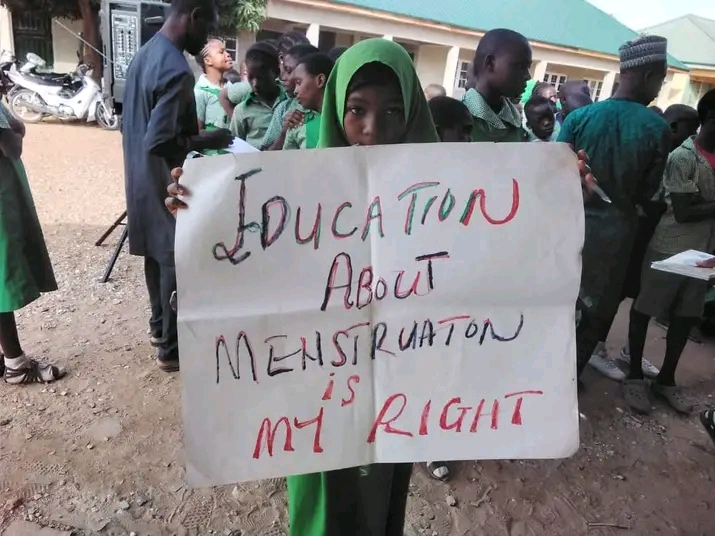During her puberty years, Funmi Olarunmola, a Lagos native, grappled with inadequate knowledge about maintaining menstrual hygiene. This lack of awareness stemmed from the cultural taboos surrounding menstruation, which hindered open discussions.
“Menstruation remains shrouded in silence. Parents shy away from discussing it with their daughters, yet girls undergo substantial challenges during their menstrual cycles,” Funmi remarked.
At the age of 50, Funmi has taken on the mission of shattering the menstruation-related silence and garnering support from individuals of all genders to promote proper menstrual hygiene among girls and women.
In 2019, she started the Citizen Participation Advancement and Awareness Initiative or CPAAI, aimed at alleviating the struggles of Nigerian citizens and empowering them to lead healthy and dignified lives.
A year later, in 2020, she launched the Pad-A-Girl project, a project focused on aiding underprivileged girls and women who experience intense pain and dehydration during their periods. The initiative primarily targets girls in primary and secondary schools, as well as women from disadvantaged socio-economic backgrounds.
Funmi highlighted that numerous girls skip school during their periods due to menstrual pain and the fear of embarrassment. “The fear of having makeshift menstrual protection visible is a significant concern,” she emphasized.
On any given day, over 300 million women globally are menstruating. Additionally, estimates suggest that at least 500 million women lack access to menstrual products and appropriate facilities for menstrual hygiene management (MHM).
The absence of sufficient water, sanitation, and hygiene (WASH) facilities in public spaces like schools, workplaces, and health centres poses a substantial challenge to girls and women.
While multiple initiatives in Nigeria distribute sanitary pads to girls and women, CPAAI distinguishes itself through its approach.
With a team of three program officers and six volunteers, Funmi spearheaded the project in schools and communities across five area councils in Abuja, the Federal Capital Territory of Nigeria. CPAAI provided school girls with reusable pads that could be washed and reused for up to five years.
“Our approach stands out because we offer washable pads that are sustainable for five years,” Funmi shared.
In each of the visited schools, a pad bank was established to cater to emergencies.
Funmi explained, “Since many girls start their menstrual periods while at school, having a pad bank is crucial.”
The pad bank domiciled in the school is meant for emergency situations and to end a situation where girls have to go back home because of their period.
The project was executed in the area councils of Kwali, Kuje, Gwagwalada, Bwari, and AMAC, benefiting over 7000 girls and women across 25 schools and local communities.
Moreover, the girls were trained to create these washable pads themselves.
Joseph Oluwa, a 17-year-old who attended a secondary school in Abuja, benefited from the project in 2022. She attested, “I received a washable pad in 2022, and it has been my go-to since then.” Oluwa also learned to craft these pads and now provides them for free to her university peers.
Igwe Benedicta, who experienced the project during her JSS three class at Junior Secondary School Keti, Abuja, shared that she gained valuable insights into menstrual hygiene. “Using the washable pad excites me,” Benedicta expressed. “This project is incredible as it has greatly helped many girls like me.”
During medical outreaches, the initiative identified poor water, sanitation, and hygiene conditions in the Kunyami and Kpanyi communities on the outskirts of Abuja. In these areas, unhygienic surroundings led to girls and women experiencing blood in their urine and faeces.
Collaborating with healthcare professionals from Gwagwalada Specialist Hospital, the initiative conducted lab tests on blood samples collected from the affected individuals.
Results were communicated to the victims, and those with minor infections received free treatment through the initiative. However, those with more severe infections requiring extensive resources were referred to health centres capable of providing free treatment.
CPAAI faced challenges related to self-funding and limited individual support for awareness campaigns, educational workshops, and the distribution of free menstrual products in rural areas. Funmi said, “Currently, our projects are self-funded, but with adequate funding, we can make greater strides to improve the lives of girls and women.”
Obstacles like poor road conditions, security concerns, and long travel distances also hinder the project’s reach in the Abaji Area Council of Abuja.
Funmi lamented, “Inaccessible roads to rural communities pose a significant challenge.”
As a Gender-inclusion specialist, Funmi aspires to make washable menstrual pads affordable and accessible for girls and women in all rural communities as the project progresses. She envisions a future where free pads are available in primary and secondary schools, ensuring that girls don’t miss school due to their periods.
She concluded by emphasizing the need to educate parents and guardians about menstrual hygiene, so they can offer emotional support and encourage proper practices among their daughters.
Funmi Olarunmola, a Lagos native, struggled with menstrual hygiene due to cultural taboos that discourage discussions on menstruation. At 50, she set out to break this silence, founding the Citizen Participation Advancement and Awareness Initiative (CPAAI) in 2019 to empower Nigerians. In 2020, she launched the Pad-A-Girl project to help underprivileged girls and women with menstrual hygiene, focusing on primary and secondary schools and disadvantaged communities.
The project addresses the challenges girls face during menstruation, including skipping school and the fear of makeshift protection being visible. CPAAI supplied reusable pads that can last up to five years and established pad banks in schools for emergencies. Over 7,000 girls and women benefited from this initiative across 25 schools and local communities in Abuja. The girls also learned to make the pads themselves.
Despite challenges like self-funding, poor road conditions, and limited support, Funmi aims to make washable pads affordable and accessible in rural areas and ensure that no girl misses school because of her period. The initiative also emphasizes educating parents on menstrual hygiene to support their daughters.






